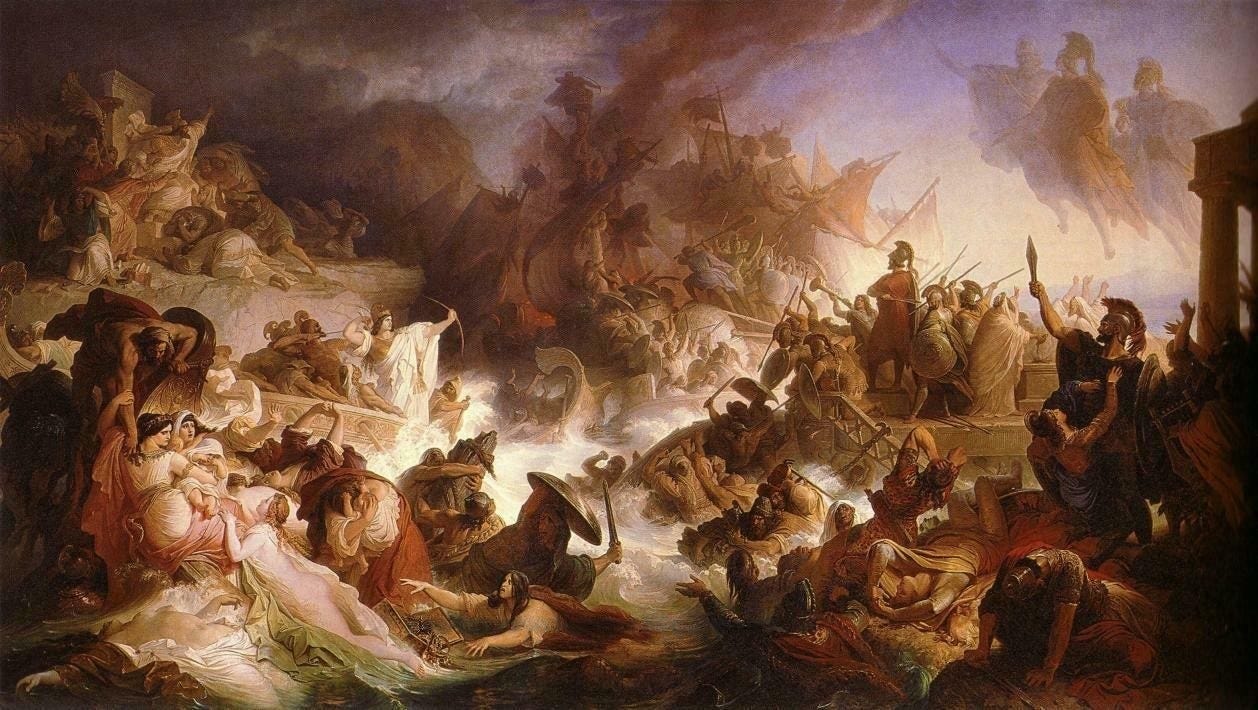
Dear Classical Wisdom Reader,
So, I have a slightly controversial Classics opinion today…
The sequel to 300 is a much better film than the original.
I’m sure you have at least a passing familiarity with the blockbuster retelling of the 300 Spartans’ last stand at Thermopylae. The belated follow up 300: Rise of an Empire showcased the Battle of Artemisium, which took place at the same time as the Battle of Thermopylae.
I know, like its predecessor, it’s VERY over the top, and far from what you’d call historically accurate, but it’s so rare to see a naval battle on screen!
But the main reason I like it is Eva Green’s performance as Artemisia of Caria. She provides a much-needed counterbalance to the uber macho sensibilities of the rest of the two 300 films.
More importantly, it shines a light on an important woman of history.
The real Artemisia was a fascinating and feared figure. An ambitious Queen and a master tactician, she sided with the Persians over the Greeks. Although she was held in high regard by King Xerxes, he ignored her advice by engaging the Greeks at sea at the Battle of Salamis. What followed was a a calamity for the Persians.
If he’d just listened to her, the Persian Wars may have gone very differently, and the world would potentially be very different today.
As is nearly always the case, the Hollywood version barely scratches the surface.
You can read all about the real Artemisia just below, but first…
Artemisia was from Halicarnassus, just like our main source for stories about her, Herodotus.
The ‘father of history’ is just one of many revered ancient writers featured in The Essential Classics, a beautiful hardback anthology of the greatest texts from the ancient world, now available at the special low price of just $49 (plus a small shipping fee). This book has previously retailed at over $200!
It includes Herodotus on the Battle of Marathon, the culmination of the Persian Wars which ushered in the Golden Age of ancient Greece.
That’s featured alongside Plato’s myth of Atlantis and his Allegory of the Cave, the myth that inspired The Matrix.
It also has the Greek tragedian Aeschylus writing about the Persians’ disastrous defeat at the Battle of Salamis in the world’s old play… You can read all about the terrible consequences of not listening to Artemisia!
It’s got Homer, Marcus Aurelius, Sophocles, Aristotle, Virgil… all this plus SO much more (including maps and biographies to offer important context), and now it’s at a special low price.
It really is ‘the best of the best’, an ideal gift for graduates, or frankly, ANYONE with a love of learning.
This offer is for THIS WEEK ONLY and runs until Monday. It’s the lowest price it will be all year, so don’t miss out!
Get your copy HERE!
Now, I’m off to see if 300: Rise of an Empire is streaming anywhere these days…
All the best,
Sean Kelly
Managing Editor
Classical Wisdom
Become a Member! Gain access to EXCLUSIVE Classics articles, podcasts and webinars you won’t find anywhere else!
Artemisia: Commander and Queen
by Van Bryan
Queen Artemisia of Caria is mentioned by a handful of ancient Greek writers who would have lived some years after her death. Most of our knowledge about her, of course, comes from the ‘Father of History’ himself. Herodotus directly makes reference to Artemisia numerous times as he recounts the events of the Greco-Persian wars. As with all of Herodotus’ writing, the authenticity of his claims are open to some speculation.
What we do know is that Artemisia was born some time during the 5th century. She was a noted naval commander at the Battle of Salamis in 480 BC, so we can conclude that her birth and ascension to queen of Caria was some time before this.
Her father was king of Halicarnassus and her mother was of Cretan descent. When she came of age, she was wed to the King of Caria, a Persian province located in modern day Turkey. Strangely enough, we know very little about this mysterious husband. He is never mentioned by name in The Histories and is effectively overshadowed by his ambitious wife. He would die mysteriously while his son was still just a boy. With a dead husband and a son that was still a child, Artemisia ascended as ruler to the prominent kingdom of Caria.
Rather than passively ruling or perhaps even surrendering control, she exercised a spirit for adventure and a penchant for warfare. Herodotus writes about her in a tone that could be considered to be one of admiration.
“Her brave spirit and manly daring sent her forth to the war, when no need required her to adventure. Her name, as I said, was Artemisia.”
-Herodotus (The Histories)
Rather than rely on brute force or sheer numbers to conquer her enemies, Artemisia was renowned for her cunning tactics and subterfuge. The 2nd century Macedonian writer, Polyaenus, tells us how Artemisia would regularly carry both Greek and Persian flags when engaged in naval combat. When pursuing an enemy ship, she would often fly a Greek flag to confuse her targets. The unsuspecting Greek warship would be caught off guard and would be set upon by the full force of the Carian fleet.
Polyaenus also reports that Artemisia once set her sights upon the ancient city of Latmus. Rather than set siege to the city with countless warriors, she instead planned a cunning ruse. The Queen of Caria positioned her soldiers into hiding near the city entrance. At the same time a great festival was prepared approximately one kilometer away from the city. Countless musicians and entertainers created a grand procession.
The event was said to have been so amazing that it drew the attention of the nearby city. The citizens and many of the soldiers of Latmus were drawn to the festival, effectively emptying the city of its occupants. With this distraction in place, Artemisia launched a full-scale invasion of the city and took it with ease.
It was during the second Persian invasion of mainland Greece that Artemisia gained a significant amount of, if not fame, then notoriety. Artemisia joined with the Persian King, Xerxes and she immediately became something of an insult to the Athenians.
Herodotus tells us that the united Greeks felt great indignation that a woman would take up arms against them, and as a consequence offered a reward of 10,000 drachmas for any man who could capture the illusive Queen.
It is before the decisive battle of Salamis that Artemisia is highlighted as a character of particular interest. At this time the Greeks were scattered, slowly collecting their forces near the island of Salamis. The great city of Athens had been lost, burned to the ground by King Xerxes. The Greeks appeared to be nearly defeated. Xerxes’ advisers told the Persian commander that he must launch a naval assault against the Greeks to destroy them entirely. This was the consensus of almost all the officers, save for one.
Artemisia advises Xerxes to take a different route. One that may very well have changed the course of history…
“Spare your ships, and do not risk a battle; for these people are as much superior to your people in seamanship, as men to women. What so great need is there for you to incur hazard at sea? Are you not master of Athens, for which you did undertake your expedition? Is not Hellas subject to you? Not a soul now resists your advance…”
-Artemisia, as recounted in “The Histories”
The Queen of Caria advised (practically implored) Xerxes to not engage the Greeks at sea. She argued that the enemy’s resources are in short supply. They will soon be out of food. Additionally the Greeks were considering abandoning Attica altogether and instead marching towards the Peloponnese, which would have undoubtedly spread their already fragile army thinner. If the Persians were to wait out the Greeks and ambush them as they attempt to march west, then certainly their enemy would fall before the might of the massive Persian infantry.
Xerxes, perhaps wishing to end the war quickly, disregarded this advice. An assault was launched, and the tide of the war turned.
What ensued was the Battle of Salamis, a military engagement that, at least for the Persians, was a complete disaster. The invaders found themselves out maneuvered and outfought by a maneuverable Greek navy that was better equipped to wage war in the narrow strait of Salamis. A decisive defeat for Persia, and something of a miracle for the Greeks, Salamis marked a turning point in the war.
It was a turning point that Xerxes would never recover from.
So yes, in case you were wondering, the most humiliating defeat of the war could have been completely avoided if the men had only listened to the advice of the one woman in the room.
During the battle itself, Artemisia distinguished herself according to Herodotus. It was said that while in the midst of battle, Artemisia’s warship was being hotly pursued by an Athenian trireme. Pressured by her pursuer and desperate for an escape, Artemisia rammed an ally ship that had unknowingly crossed her path. Witnessing this, the pursuer quickly gave up the chase, assuming that Artemisia was an ally of the Greeks.
Meanwhile Xerxes was perched upon a cliff. Sitting on his throne, he watched the battle unfold below him. Herodotus tells us that upon seeing Artemisia ram the ally ship, Xerxes made the assumption that the the Queen of Caria had, in fact, defeated an Athenian vessel. Xerxes was so impressed with this brutal assault that he is reported to have said…
“My men fight like women, and my women like men!”
It is rather lucky for Artemisia that upon ramming this Persian vessel, the entire crew, including the captain, sunk beneath the waves and drowned. Had anybody survived the attack, they would have undoubtedly become Artemisia’s accuser.
At the conclusion of the battle, the Persian King was rather disheartened by the loss. He once more sought the council of Artemisia, knowing full well that had he listened to her before, things might have gone differently for his army.
Artemisia advised Xerxes that it would be best for him to return home and to allow the general Mardonius to continue the expedition with a contingent of 300,000 soldiers. Having already razed Athens to the ground and fearing another humiliating defeat, Xerxes left the Greek mainland and abandoned his campaign.
As for Artemisia herself, she was entrusted with the care of Xerxes’ children. She accompanied them to the town of Ephesus on the Ionian coast. The Greeks and the Persians would be at war with each other for some time yet. But for Xerxes and Artemisia, the fighting was over.
And what of her death? We cannot say for sure. While she did not perish in battle, her eventual demise remains something of a mystery. A legend reported by Photios, the Ecumenical Patriarch of Constantinople from 858 to 867, tells that Artemisia fell in love with a man named Dardanus. After he denied her his love, Artemisia hurled herself over a cliff and sunk beneath the Aegean.
We may be dubious of such a claim. It seems rather difficult to believe that a woman as strong willed and as brave as Artemisia would seek her own demise over lost love. However her story may have ended, her life remains a topic of fascination. Not content to live passively, she found adventure and glory amidst the giants of her time.
Queen, conqueror, commander, she was a remarkable woman in a time when women were often encouraged to remain anonymous.
Más info en frasco@menadelpsicologia.com / Tfno. & WA 607725547 Centro MENADEL (Frasco Martín) Psicología Clínica y Tradicional en Mijas Pueblo #Psicologia #MenadelPsicologia #Clinica #Tradicional #MijasPueblo
*No suscribimos necesariamente las opiniones o artículos aquí compartidos. No todo es lo que parece.



No hay comentarios:
Publicar un comentario